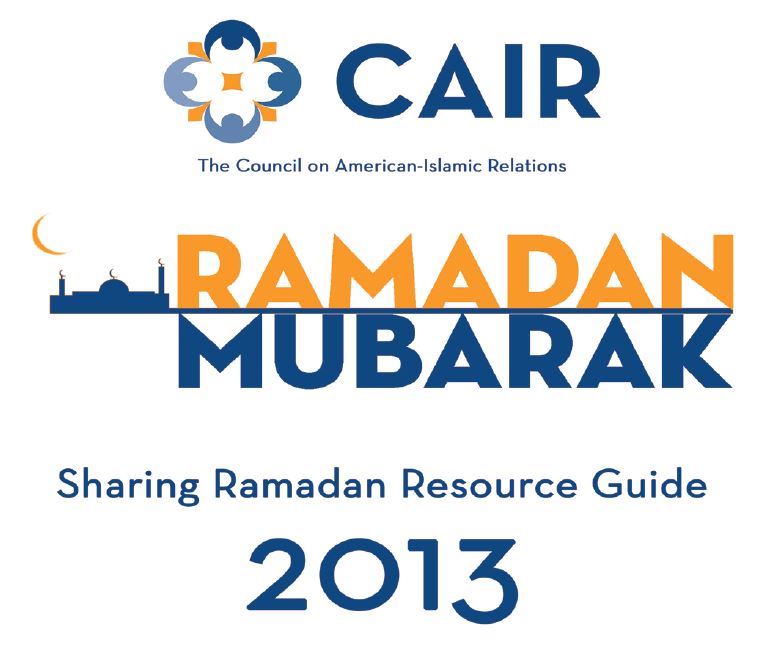CAIR Oklahoma is a proud supporter of the Sharing Ramadan initiative adopted from CAIR National in 2008 as a way to help educate our fellow Oklahomans about the month of Ramadan and in the process, educate our neighbors, colleagues, and friends about Islam and Muslims in Oklahoma. Given that sharing and appreciation are essential components of Ramadan, we encourage individuals, families, local mosques, community centers, and Muslim schools to take this opportunity to invite their neighbors to join them for an iftar meal and learn more about our faith.
The Prophet Muhammad (peace be upon him) said: “Whoever fasts in the month of Ramadan out of sincere faith and hoping for a reward from God – all his previous sins will be forgiven.” (Sahih Al-Bukhari, Volume 3, Hadith 125)
Prophet Muhammad (peace be upon him) said: Ramadan “is the month of sharing with others.” (Al-Tirmishi, Hadith 614)
The Importance of Sharing Ramadan
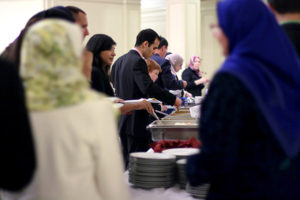 Ramadan is the month on the Islamic lunar calendar during which Muslims fast from the break of dawn to sunset, in order to learn discipline, generosity, and empathy for the many people in the world who go hungry. Ramadan is a special time of the year for Muslims all across the world. It is during this month that Muslims not only abstain from food and drink but also learn the importance of charity through fasting. What better way to exemplify the ideals of the month of Ramadan than by sharing in the experience with someone from another faith?
Ramadan is the month on the Islamic lunar calendar during which Muslims fast from the break of dawn to sunset, in order to learn discipline, generosity, and empathy for the many people in the world who go hungry. Ramadan is a special time of the year for Muslims all across the world. It is during this month that Muslims not only abstain from food and drink but also learn the importance of charity through fasting. What better way to exemplify the ideals of the month of Ramadan than by sharing in the experience with someone from another faith?
Each year Ramadan presents us with a wonderful opportunity to celebrate the interconnectedness of the Abrahamic faiths and our shared values as a community. By sharing Ramadan with others, we can show our friends and neighbors that Oklahoma Muslims are a part of the diverse community of this state.
How Can We Share Ramadan with Our Fellow Oklahomans?
Sharing Ramadan is an annual campaign adopted by CAIR Oklahoma to encourage local communities to host iftar dinner receptions and open houses for our neighbors of other traditions. Since sharing and appreciation are essential components of Ramadan, we hope local mosques, community centers and Muslim schools will take this opportunity to invite their neighbors to join them for an iftar meal.
Download the Sharing Ramadan Resource Guide, in which, your community will find recommendations for how to organize and publicize Sharing Ramadan events. Samples of press releases and other publicity materials are included to help make this initiative successful.
We suggest that each community interested in hosting a Sharing Ramadan iftar form a local committee in charge of organizing the event. This committee can be responsible for sending invitations out to local churches, synagogues and civic groups. The committee can also use the draft press release included to send to local media outlets who may want to cover the event. These are only a few of the ways that this packet can help our local communities successfully share their Ramadan.
An Opportunity to Learn More About Islam and Muslims in Oklahoma
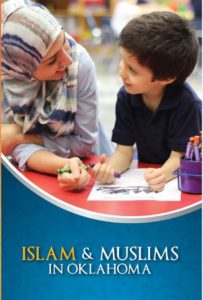 There are fewer things that unite human beings easier than breaking bread and sharing a meal with your neighbor. What better way to help your fellow Oklahoman understanding Islam and Muslims better than to discuss over a meal on a evening in the month of Ramadan.
There are fewer things that unite human beings easier than breaking bread and sharing a meal with your neighbor. What better way to help your fellow Oklahoman understanding Islam and Muslims better than to discuss over a meal on a evening in the month of Ramadan.
CAIR Oklahoma has made the task of explaining Islam and Muslims in Oklahoma to your neighbor easier through the publication of a new brochure. This brochure is a concise way to open up up conversation and dialogue. CAIR Oklahoma can also aide in providing copies of English translations of the Holy Quran, educational DVDs, and other materials that will help spread credible information about Islam.
An excerpt from our brochure describing Oklahoma Muslims reads:
Oklahoma Muslims are truly diverse, coming from nearly all walks of life. Muslims here represent a vast number of races, nationalities, languages, socioeconomic statuses and more. They are proud to call Oklahoma home because it’s a place that encourages hard work and good values. Oklahoma Muslims are committed to contributing to the betterment of the state and many do so by owning their own successful business, working as doctors throughout the state, or attending Oklahoma universities.
If interested in receiving educational materials free of charge, please contact us at 405-415-6851 or by using our online form.
Answer Questions About Ramadan for Your Neighbors
When Sharing Ramadan, this is an excellent opportunity the help answer questions that your friends, colleagues, and neighbors have about the month of Ramadan and the practices of Ramadan.
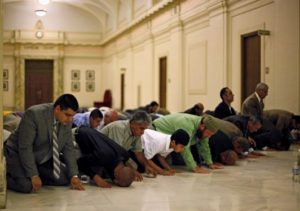 Q: How did the fast during Ramadan become obligatory for Muslims?
Q: How did the fast during Ramadan become obligatory for Muslims?
A: The revelations from God to the Prophet Muhammad that would eventually be compiled as the Quran began during Ramadan in the year 610, but the fast of Ramadan did not become a religious obligation for Muslims until the year 624. The obligation to fast is explained in the second chapter of the Quran:
“O ye who believe! Fasting is prescribed to you as it was prescribed to those before you, that ye may (learn) self-restraint…Ramadan is the (month) in which was sent down the Quran, as a guide to mankind, also clear (signs) for guidance and judgment (between right and wrong). So every one of you who is present (at his home) during that month should spend it in fasting…” (Chapter 2, verses 183 and 185)
Q: What do Muslims believe they gain from fasting?
A: One of the main benefits of Ramadan is an increased compassion for those in need of the necessities of life, a sense of self-purification and reflection and a renewed focus on spirituality. Muslims also appreciate the feeling of togetherness shared by family and friends throughout the month. Perhaps the greatest practical benefit is the yearly lesson in self-restraint and discipline that can carry forward to other aspects of a Muslims’s life such as work and education.
Q: Why does Ramadan begin on a different day each year?
A: Because Ramadan is a lunar month, it begins about eleven days earlier each year. Throughout a Muslim’s lifetime, Ramadan will fall both during winter months, when the days are short, and summer months, when the days are long and the fast is more difficult. In this way, the difficulty of the fast is evenly distributed between Muslims living in the northern and southern hemispheres.
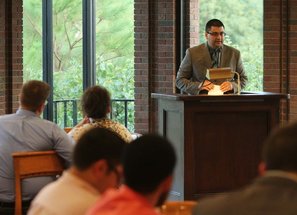 Q: What is Lailat ul-Qadr?
Q: What is Lailat ul-Qadr?
A: Lailat ul-Qadr (“Night of Power”) marks the anniversary of the night on which the Prophet Muhammad first began receiving revelations from God, through the angel Gabriel. An entire chapter in the Quran deals with this night: “We have indeed revealed this (Message) in the Night of Power: and what will explain to thee what the Night of Power is? The Night of Power is better than a thousand months. Therein come down the angels and the Spirit by God’s permission, on every errand. Peace! This until the rise of morn.” (Chapter 97) Muslims believe Lailat ul-Qadr is one of the last odd-numbered nights of Ramadan.
Q: Is it difficult to perform the fast in America?
A: In many ways, fasting in American society is easier than fasting in areas where the climate is extremely hot. In Muslims countries, most people are observing the fast, so there are fewer temptations such as luncheon meetings, daytime celebrations and offers of food from friends.
Q: How can co-workers of other faiths and friends help someone who is fasting?
A: Employers, co-workers and teachers can help by understanding the significance of Ramadan and by showing a willingness to make minor allowances for its physical demands. Special consideration can be given to such things as requests for vacation time, the need for flexible early morning or evening work schedules and lighter homework assignments. It is also very important that Muslim workers and students be given time to attend Eid prayers at the end of Ramadan. Eid is as important to Muslims as Christmas and Yom Kippur are to Christians and Jews. A small token such as a card (there are Eid cards available from Amazon.com) or baked goods given to a Muslim co-worker during Eid ul-Fitr would also be greatly appreciated. Hospital workers should be aware that injections and oral medications might break the fast. Patients should be given the opportunity to decide whether or not their condition exempts them from fasting.
Q: Do people normally lose weight during Ramadan?
A: Some people do lose weight, but others may not. It is recommended that meals eaten during Ramadan be light, but most people can’t resist sampling special sweets and foods associated with Ramadan.
Q: How do Muslims Celebrate the Ending of Ramadan?
A: Muslims around the world celebrate the ending of the month of fasting with a day of celebration and gift-giving called Eid ul-Fitr. Eid ul-Fitr is a true day of giving thanks for all Muslims as they show their real joy for the health, strength and opportunities of life which God has given to them to fulfill their obligation of fasting and other good deeds during the blessed month of Ramadan. The day of celebration is traditionally started with a offering of prayers at a local Islamic center as well as a short sermon that focuses on the blessings of God.

